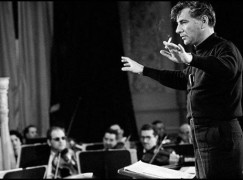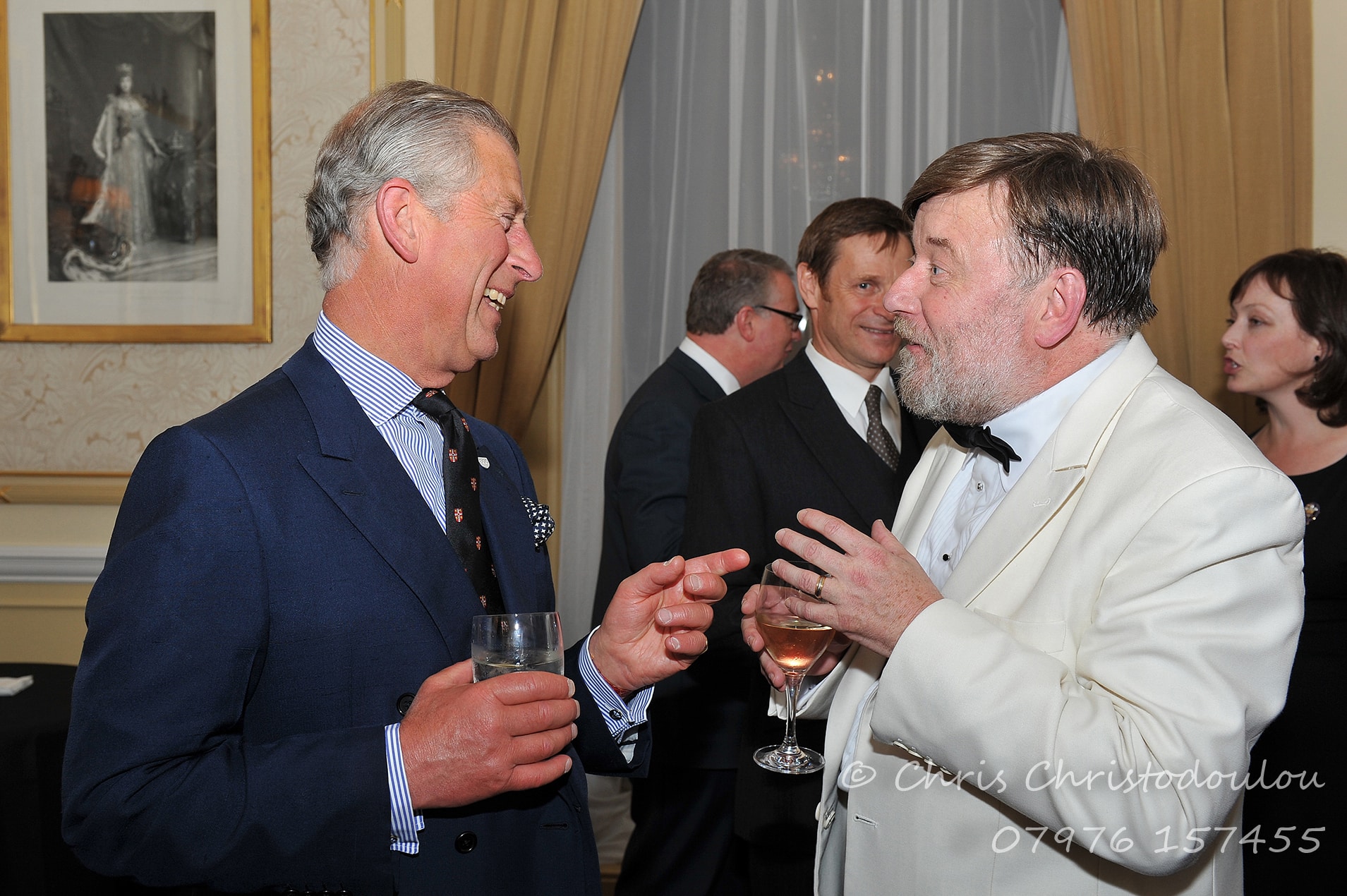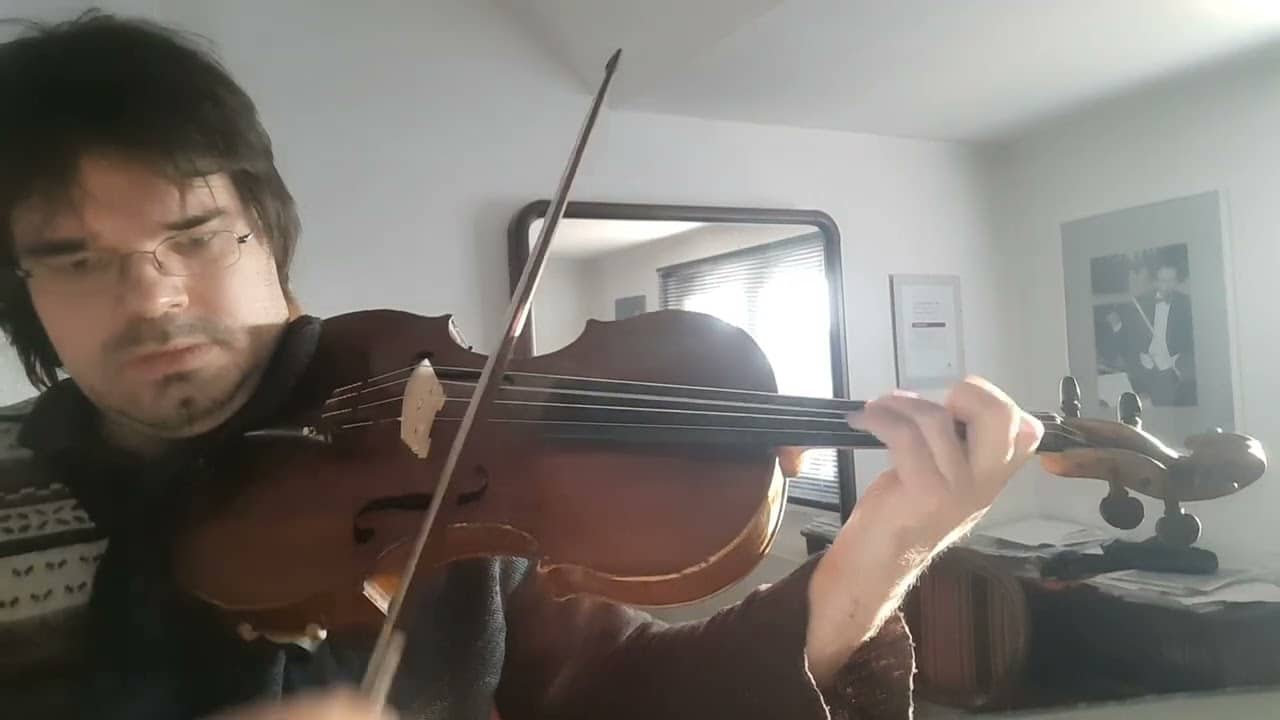How Leonard Bernstein failed to transform the New York Philharmonic
mainFrom Joseph Horowitz’s centennial essay on a failed messiah:
Bernstein’s disappointment upon leaving the Philharmonic was undisguised. He knew that he had failed to transform the orchestra into something dynamically American. He had endured steady complaints—basically valid—that it lacked the gold-standard polish of the orchestras in Boston, Philadelphia, Chicago, and Cleveland. But if his were not the accomplishments he had once envisioned, they were formidable and distinctive. He had not remotely succeeded in canonizing an American repertoire. But, starting from scratch, he had established the iconic importance of Charles Ives. He had singlehandedly canonized Nielsen and helped to restore Sibelius’s luster. And he had left a central legacy honoring a composer and Philharmonic music director far bigger than himself: Gustav Mahler….
Read on here.






Sometimes, a bit of being ‘rough around the edges’ can be more exciting than a well honed, suave machine.
But did Bernstein make it worse? Because if all he did was to fail to transform the orchestra, it means that all his predecessors also failed to transform it: Mitropoulos, Walter, Toscanini.
I mean, if Toscanini could not transform the Philharmonic (or maybe he DID! Maybe NY was far worse when before got there!), then no one is expected to.
Maybe the NY Phil is simply incorrigible. A city does have a personality.
New Yorkers are not Clevelanders.
To respond to “Bernstein’s failure” in words is unnecessary.
Listen to Bernstein and the NY Philharmonic in 1964 performing Sibelius’s “Pohjola’s Daughter.”
https://www.youtube.com/watch?v=giko_kOZGPc
And if you were fortunate enough to attend the current performances of today’s NYPhil playing the same this week — even in this imperfect hall — you would have given a nod to Bernstein who left a legacy to those who were infected with his love and enthusiasm for music.
Lenny did a great job with Howard Brubeck’s Dialogues for Jazz combo and orchestra.
I doubt many of us would have heard Harris 3 if not for Bernstein…
For reasons unknown, Micheal Tilson Thomas has never conducted Harris 3 during his entire tenure at the SFO.
Actually Roi Harris’ 3rd existed already in Toscanini’s NBC recording….if that actually matters…
Maybe. If you listen to Ives 3 you can hear where Harris was inspired.
Bernstein was a great composer, interpreter and programmer, but perhaps just not an orchestra builder.
And the NYPO recordings perhaps also suffer from Columbia being a little behind RCA in the recording-engineering business (and a poor venue?).
I have to agree he was not perhaps the best orchestral training. In fact the NYPO sounded better at the beginning of Lenny’s tenure than at the end. But he compensated that by some marvelous music making, and that is what matters most.
Horowitz’s comments are illuminating and nuanced. I don’t share all of his views. As a younger contemporary, I was greatly influenced by Bernstein’s wide-ranging musical tastes, insights, and passion for causes, musical and social. Certainly Bernstein was mercurial. Horowitz helped me appreciate how maddening that characteristic must have been for his peers (and how much it undermined his credibility with them). That manifestation of curiosity, though, was what humanized him to his younger, more attention-challenged audiences. I adored him and appreciated greatly Horowitz’s illuminating portrait!
I just read the article by Joseph Horowitz attached to this article, and although I admire his writing style and scholarship, it greatly saddened me to read something which jumped out at me from the many statements about Bernstein’s tenure at the NY Philharmonic— the sentence that states (about Bernstein returning for a YPC in 1984) that “even the orchestra did not want him.” Nothing could be farther from the truth. At the time that Pierre Boulez
decided to return to Paris, Carlos Moseley tasked the orchestra’s artistic committee with polling the orchestra about 8 conductors he had selected from which to choose the next music director. The orchestra voted for Bernstein to return, but the managing director Carlos M. chose otherwise. The orchestra had a meeting with Carlos M. to try to find out why he had ignored their choice. He gave his reasons for each….and the orchestra realized that their professional opinion had not mattered to management. So if Bernstein had returned as the orchestra wished, perhaps there would have been a renaissance of both orchestra and conductor together — after all, the hallmark of the NY Philharmonic has always been its versatility, its ability to
change styles on a dime, to play more concerts of varied repertoire than any other orchestra in the country. Bernstein made over 400 recordings with the NYP, which can be treasured (along with many other historical recordings such as Toscanini & Beethoven #7, Mengelberg & ”Ein Heldenleben”, etc.)
I remember a superb Tchaikowsky programme in Avery Fischer Hall by Bernstein and the NYPO around the time Kleiber conducted Traviata at the Met in 1989. Outstanding, and that was 20 years since he left the directorship of the orchestra!
I don’t know about this “the orchestra didn’t want him” nor this YPC anniversary in 1984. What I DO remember is that Bernstein led a magnificent Mahler 2 in early 1984 (not the one in his DG Mahler cycle, which was done in 1987, referenced in the article). And he recorded a number of other things with the Philharmonic (Copland 3, and another disc including the clarinet concerto, the Harris/Schuman 3rd symphonies, Ives 2, others). I assume he was always a welcome guest at the Philharmonic. And while I don’t know if Mehta was a great MD choice in 1978, I can understand why the management didn’t go for a second Bernstein administration; maybe better as an affair than a marriage.
His just b was not to transform anything. He succeeded in giving the orchestra and audiences a wide variety of repertoire, inspiration, unforgettable moments, and a recording legacy. It could have gone the other way too, but being the ultimate all-around musician, he left his mark in the continuum of music and with the people whose lives he touched. Perhaps he had other goals in mind, but he left an indelible mark in the history and sonic landscape of New York, the country, and the world.
With all due respect, I disagree about the Mehta period being a “Dark Age” for the NYPO. I’m aware of Mehta’s reputation as a shallow, flashy showman, but IMO it is undeserved. It’s possible the orchestra didn’t like him, and it’s possible the audiences didn’t either. I don’t know. I’ve never heard them live, so I can only go by their recordings.
I would point to his Brahms cycle from the late 70’s/early 80’s — marred only by the unfortunate-IMO choice of Isaac Stern as soloist for the Violin Concerto — to back up my argument.
(available as a download on Amazon: https://tinyurl.com/y8cm5xpr)
(If you don’t agree, oh well.)
I have two very fond memories of the NYPO from the Mehta era, though I can’t speak about their week to week activity in NY.
I heard them live on tour in Vienna in September 1980 and was deeply impressed by their sound. Parts of the Don Quixote still ring in my ears. Mehta conducted.
Around the same time I bought an LP of the NYPO under Bernstein performing Shostakovitch’s 5th symphony, recorded live in Tokyo the year before.
That Shostakovich performance is amazing.
How can you call him any kind of failure? Why did the orchestra need transformation? It’s a false argument. If they’d wanted transformation, they’d have hired a Fritz Reiner, not a Carl Reiner like Bernstein. He was not a technician. He got them to play expressively. He tried to hire strong players, though the union sometimes got in his way, as with the principal harp position. The question is, why is it in the culture of this orchestra to have a bad attitude, if it still does?
It is usually not my place to enter a discussion such as this one, but the simple truth is this. If you ask almost anyone which conductor they most associate with the NY Phil, the answer is always going to be Bernstein. Whatever shortcomings he may have had, his impact on the orchestra, its repertoire and the NY public was far beyond any other music director of that ensemble.
And to answer another query that came up, not any conductor conducts everything. Yes, there are pieces that we would have like to have heard Bernstein do, but all we should care about is what he did, rather than what he did not.
The maestro nailed it!
+1. Bernstein may not have been a great “orchestral trainer” but I’ll take the seat of the pants excitement he delivered any day of the week.
John,
His Sebelius 1st
https://www.youtube.com/watch?v=hnZUayjPpo0
and Shostakovich fifth
https://www.youtube.com/watch?v=0FF4HyB77hQ
prove your point.
Tony
Agreed, Leonard. Despite any shortcomings, Bernstein’s aura and passion alone made the NYPhilharmonic shine. And his Young People’s concerts educated millions of viewers that otherwise never would have given classical music a thought. A stellar concept and achievement.
By the way, I like a lot “Conducting Business: Unveiling the Mystery Behind the Maestro”. Really nice book. It is also interesting John Sant’Ambrogios stories about your tenure in St. Louis in “The day I almost killed Boston Symphony”.
Far fromaccurate. Sibelius,Mahler, Nielsen were already stablished composer in the rest of the world. Walter, kubelick etc had alreay recorded all Mahler symphonies much time before Bernstein did. I can agree with the assertion about Ives. Anyway, I’m glad to see historical justice concerninga NY Philharmonic of the 60’s. Believe me, everyone in NY spend their time waiting Ormandy’s band come ro town
Americans got the tendency to overule their heroes
I agree about the hyperbole on Bernstein’s popularization of Mahler. Bernstein’s immediate NYPO predecessor, Dimitri Mitropoulos, was yet another exponent of Mahler.
I would like to point out, however, that Kubelik’s DG Mahler cycle with the BRSO was recorded 1967-71, so it did not predate Bernstein’s NYPO tenure.
Dimitri Mitropoulos! Great Mahlerian, despite tge fact we got only radio records that quality of sound isn’t in the same league. M. Pollini usually says he was the best conductor he ever saw.
Indeed about Kubelik. However we can imply that he had been conducting Mahler long time before the DG records. It was not due to the fact of a Bernstein “revival”.
Walter didn’t conduct all the Mahler symphonies. He didn’t rate them all. As I recall Kubelik and Bernstein recorded cycles were more or less contemporaneous followed shortly after by Solti and Haitink. Otto Klemperer also recorded some of them as did Barbirolli, but not all.
But to get back to the point, Bernstein’s career could hardly be called a failure by any stretch of the imagination. The NYPO were seen as one of the great American orchestras under Bernstein. I don’t think they are up there nowadays. When Alan Gilbert ended his tenure there, the orchestra said of him, “he changed the way we think of ourselves”. What on earth did that mean?
Here they are playing in New York accompanying Andrea Bocelli and Tony Bennet under maestro Gilbert.
https://www.youtube.com/watch?v=4TFX0i0m_WY
in a Leonard Bernstein number no less, “New York, New York”. So perhaps what they meant was, “we used to think of ourselves as a world-class symphony orchestra, but now we think of ourselves as accompanyists to crooners”.
Nielsen symphony recordings were not that common when Bernstein made his recordings. Sibelius had gone out of fashion and conductors like Sir Malcolm Seargent and Leonard Bernstein helped to bring him back into the repertoire.
Ormandy Had been conducting Sibelius since the 30’s. He knew the composer in person, and started to record all symphonies in the 50’s for RCA. Actually He is the person that recorded Sibelius for the first time outside Scandinavia, and took Philadelphia orchestra on tour to Finland in 1955, and played Sibelius music in front of the composer. Koussevitzky, Stokowski and Beechan followed Ormandy.
Yehudi Menuhin and Frits Busch often played Nielsen concertos and recorded it in the 50’s, just to name a few artists that were more well-known at that time and close to Nielsen music. I can say a number of lesser known conductors that had already recorded the symphonies in Europe. We cannot even consider Bernstein rercods effective, since many ones in NY had never heard about Nielsen before Gilbert recent Records (Please, I’m not comparing Gilbert with Bernstein. It is just to remind a fact that the composer wasn’t in mind of the audience decades later).
As I said, not even inside the USA Bernstein was the guy that brought these composer back to the concert hall. Outside the USA, it is even more clear. Nevertheless I agree about his great importance, but I don’t agree with the overestimation about him as the top reviver of all mentioned composers.
NYPH was in fact far from a bad orchestra in the 60’s, but comparing with other big 4 at that time, it can be easily in the 3th or even 4th position. If not, we can blame the quality of the records as some other are doing. In my opinion and considering now-a-days standards, all big 4 orchestra had their own sound, but it was too much the same for all composer. Still using Philadelphia as example, they bold and lavishing string section sound was always like it, from Bach to Shostakovich.
Anyway, we’ve got L. Slatkin opinion here. Here had been following Bernstein career for a long time, as he mentions in his great book “Conducting Business: Unveiling the Mystery Behind the Maestro”.
I am glad you mentioned Alan Gilbert’s recordings of the Nielsen symphonies. They won an award and are highly regarded, although I have not heard them myself. I would recommend his recordings of symphonies and other works by Christopher Rouse. I think Rouse’s compositions should be heard more.
I felt my previous post was a bit unfair and his championing of contemporary music deserves great credit. In this aspect he is a worthy successor to Leonard Bernstein.
As someone put it, “In eight years as Music Director of the New York Philharmonic, Gilbert succeeded in transforming the orchestra, already one of the nation’s most venerable arts institutions, into a leader on the cultural landscape.” http://www.alangilbert.com/en-us/biography/ Obviously an objective view.
Pierre Boulez spent his tenure as conductor of the NYP cleaning up Bernstein’s crap.
Crazy. It was the other way around. Bernstein was the true musician, PB definitely NOT.
May we go back to Levine bashing, or, Mirga sanctification?
😉
Levine bashing is now packaged with Gelb bashing.
Give him a few hours…
Best comment so far 😉 lol
Well, yet another “The glass is half empty” observation from this sourpuss writer. “Failed?” Can we really expect one man to do everything? America has yet to produce another native son who achieved half of what Lenny achieved. And let’s not blame him that the bulk of the 20th century’s American symphonic canon has vanished – as most of it simply wasn’t all that good.
Totally agree….
One problem for us today in evaluating the NYPO era under Bernstein is the often brash Columbia Records engineering combined with the move after 1962 to recording in the troublesome acoustics of Philharmonic (Avery Fisher/David Geffen) Hall.
Alan
I don’t know what else you would expect from The Weekly Standard – a conservative rag that is doggedly fighting the ideological battles of the last century, when Bernstein actually was a “leftists” celebrity with a small amount of cultural influence. I almost laughed out loud when I clicked on the link and saw where it was taking me.
I’m not saying you shouldn’t read and think about this essay but please be aware of the fertilizer it’s growing in.
Curiously during Bernstein’s last several years with the NY Phil, George Szell became closely associated with the orchestra until his death in 1970. He was awarded the title “Senior Adviser”. I have wondered why the orchestra reached out to Szell in such a way. Sort of a “steady hand on the tiller”?
Bernstein and Szell were very found of one another, with Bernstein weeping upon hearing of Szell’s death. Despite such opposites in conducting style, they clearly admired one another.
Music brings people together. And on SD we are all united in mutual disagreement.
John,
You are right there. If Norman puts a post up about something to do with Mahler or Yuja Wang, then keyboards all over the world start going into overdrive. But it’s all good fun.
And I certainly pick up some interesting news.
Best Wishes,
Tony
Agreed!
A curious argument, spurious at best, for the definition of “transform” transforms almost as effectively in a mercurial way as Bernstein himself. One downbeat and Bernstein transforms the orchestra. One children’s concert and the mold breaks, artisans recast it, and its on to the new season with little looking back. How many concert going children were transformed? How many like my own grandmother, who refused to listen to anyone past Brahms, found themselves transformed by Schoenberg’s Variations, op.31? Or, how many countless concert goers thought, right or wrong, themselves transformed at each of his concerts? One cannot answer this question, much less its corollary, To what or where were any transformed? The concerts are over and audience members moved on with their lives not giving this question a passing glance. It is moot: there were those who were and those who were not. Despite this, Bernstein’s legacy certainly very different than Walter”s, impresses this orchestra and its audience today. Perhaps a more pertinent question that stands the test of time: How many found themselves moved by Bernstein and how often during his tenure? Learning music is easy. The hard part is finding out what is easy!
So, otherwise, the best to all with the puddles that abound when we search for what about music is easy.